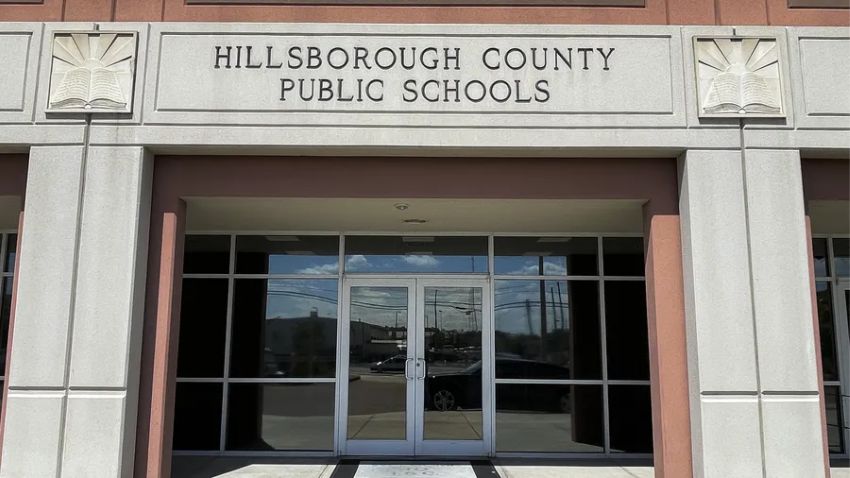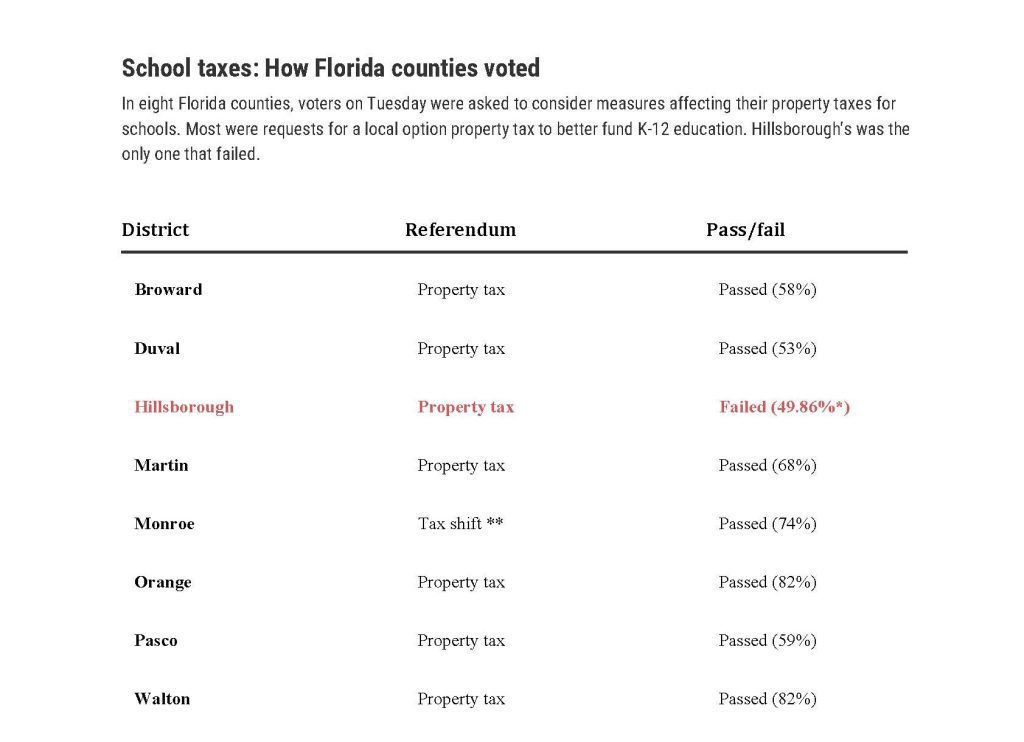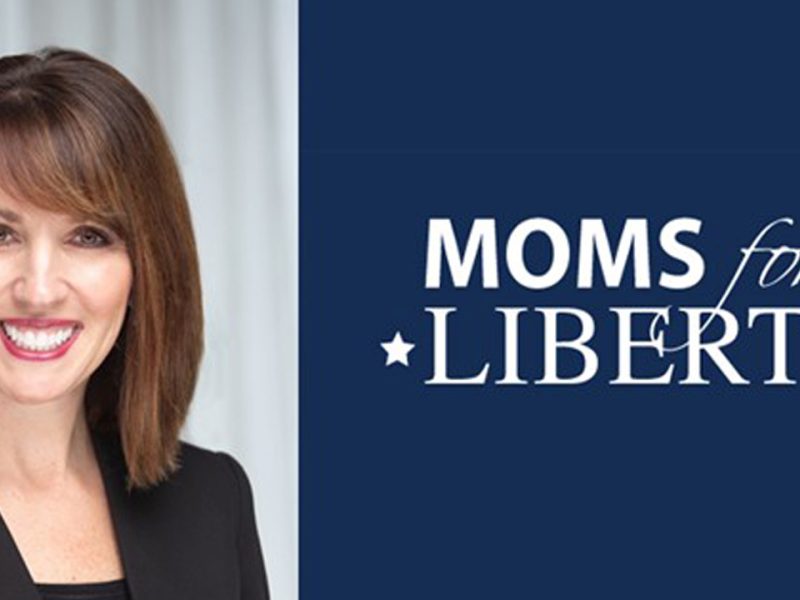
Hillsborough rejected school tax while other Florida counties said yes
The vote was close and a recount is planned, but the loss appears real. What happened?
Tampa Bay Times | By Marlene Sokol | Updated August 25, 2022
After a year of accomplishments, including a climb from 35th to 19th in a state ranking of districts, the Hillsborough County school system awoke Wednesday with an unwelcome distinction.
It’s the only Florida district to lose a tax referendum in Tuesday’s election.
Defeats are rare when school systems ask local voters to make up for state shortfalls in funding. Last year, 20 out of 21 such measures passed. This year, voters in seven other districts — including Pasco County — gave their approval, some by huge margins. In Orange and Walton counties, 82% of voters said yes.
In Hillsborough, the vote was 49.86% for and 50.14% against — a difference so slight that the Supervisor of Elections Office will conduct a machine recount Friday morning.

Jeffrey S. Solochek | Times Source: Local election supervisors
The news hit some teachers hard.
“I can’t see anything other than more vacancies and even larger class sizes come January,” Newsome High School social studies teacher Brian Ayers tweeted. “There is no incentive now to pursue a teaching career in Hillsborough County.”
What went wrong?
Educators offered a lot of theories Wednesday. And there was no shortage of finger-pointing — at the teachers union, at toxic social media platforms, at the economy, at the Tampa Bay Times and at a superintendent, Addison Davis, who joined the district in 2020 as COVID-19 lockdowns began.
While the pandemic hampered Davis’ attempts to integrate himself into the community, Tuesday’s defeat was no less damaging. Not enough voters trusted the district to properly spend an additional $146 million a year, including many of its own employees.
Why would tax measures pass in seven other counties and fail in Hillsborough?

School board chairperson Nadia Combs said the difference might be that housing costs are rising more sharply in Hillsborough than almost anywhere else in the state.
“People are all going to point to everyone else,” Combs said. “They’re going to blame the board, blame the union, blame the Times. The one thing I don’t blame, I don’t blame the superintendent.”
Combs and others also said they believe the Times’ July 21 editorial against the tax made a difference in an election with a margin of 619 votes out of more than 220,000 cast.
The editorial reminded readers that for years the district employed questionable spending practices that took it to near insolvency. It noted that Davis has gone far to slash costs and balance the budget, but asserted that the district needs more time to establish a solid track record.
In addition, the measure did not have the full support of the school board, which voted 4-3 to place it on the ballot. During the campaign, dissenting members Karen Perez and Stacy Hahn — who both won reelection Tuesday — maintained their opposition to the tax. Perez called for more transparency in spending, while Hahn asked to see more belt-tightening.
The nature of the campaign also might have played a role. Davis took the lead, meeting with business and economic organizations. The district’s lobbying firm, Shumaker Advisers Florida, was enlisted to organize a political action committee, Strong Classrooms for our Future.
But, judging by the contributions that the committee reported, there was little evidence of support from the general public. The listed agents for the group did not return phone calls seeking comment.
In Pasco, which passed its referendum with 59% of the vote, the political action committee was headed by former school employees who presented a public image of citizens who wanted to strengthen their community.
“And I think we got started earlier, too,” said Linda Cobbe, the onetime Pasco schools spokesperson who was the group’s communications director. She described a strategy, assisted by consultants, that focused on independent voters instead of spending resources on those most likely to reject the tax.
Measures in both counties were supported by teachers unions, but Pasco took the added step of promising that none of the money would go to administrators. Surveys showed that resonated strongly, Cobbe said.
Hillsborough, in contrast, had written agreements promising the tax would support raises to both teachers and administrators. Leaders of the administrators association joined the teachers union in backing the measure.
But rank-and-file teachers were not entirely supportive.
Some said on social media platforms that they did not trust Davis or his administration with the money. A common theme was that Davis took a raise before the teachers were given one. That statement was not true — Davis’ new contract does not give him a raise until employees get them. But critics kept repeating it.
Making matters worse for the district, the teachers union declared an impasse in salary negotiations on July 28. Union leaders said the district has enough new money to pay the teachers their advertised raises and give them credit for the years they have worked, instead of the one-time supplements the district offered. The district denies this assertion, saying its new money is earmarked by the state for other expenses.
Union president Rob Kriete said he knew the tax measure was in trouble because members kept asking questions about the pay raise agreement rather than focusing on the need to pass the tax and ensure a stable work force.
“I feel dejected and upset,” Kriete said. “The real losers are our students.”

In a statement Wednesday, Davis said the district has worked hard to gain the community’s trust and develop “a sound financial recovery plan that has led to the first surplus for our district in over a decade.”
He warned, as before, that the defeat places the district in even more peril as it contends with widespread teacher vacancies and surrounding districts increase pay.
He said he planned to push for another tax measure in 2024.
In the meantime, the teachers union and district leaders return to the bargaining table Monday.
Staff writer Jeffrey S. Solochek contributed to this report.





